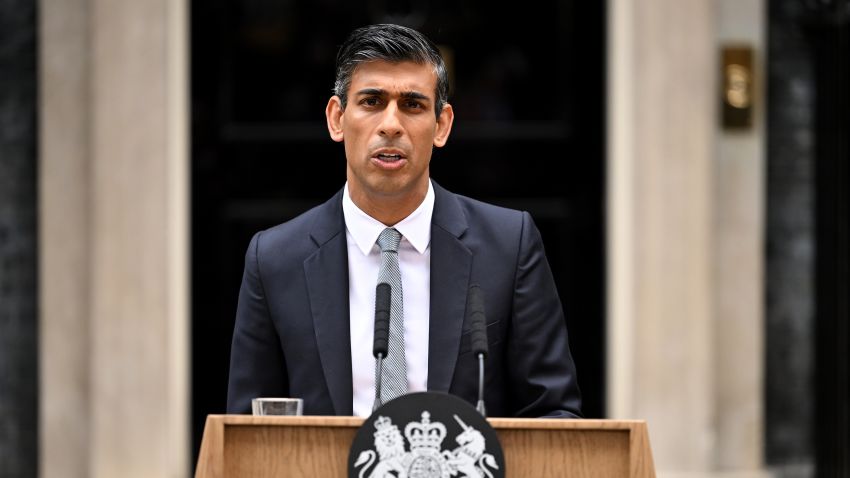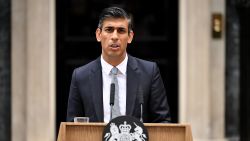Editor’s Note: Jens Larsen is director of macro-geoeconomics at Eurasia Group, a political risk consultancy. The opinions expressed in this commentary are his own. View more opinion at CNN.
The economic consequences of Liz Truss’s record-short spell as UK prime minister will be long-lasting and present a formidable challenge to Rishi Sunak, who is replacing her. Truss’s government squandered the UK’s longstanding reputation for fiscal prudence, and rebuilding that will be costly, particularly in these geopolitically challenging times. Restoring the credibility of the UK’s economic policy should be Sunak’s top priority.

Truss set out to challenge “economic orthodoxy” with a package of energy subsidies, tax cuts and a promise of supply-side reforms that would lift growth. But the plan was unfunded, causing the pound and government bonds to crash.
When bond prices fall, yields rise, making it more expensive for the government to borrow. Further, the Office for Budget Responsibility (OBR), the UK’s fiscal watchdog, was not allowed to judge what the plan meant for public finances, leaving the market guessing what the economic and fiscal impact of the plan might be. The volatility forced the Bank of England to make a temporary emergency intervention by buying government bonds.
Now, Sunak must move quickly to restore the government’s credibility by showing that its fiscal plan is sustainable, and that presents both political and economic challenges.
The government appears to have already made some headway. Jeremy Hunt, the new chancellor of the exchequer, has effectively reversed Truss’s budget policies and has reduced the two-year cap the government offers on energy prices – meant to protect households against rising energy bills – down to six months. That alone significantly reduces the risk that continued high gas prices push up government spending unsustainably.
Further measures, likely to include higher windfall taxes on corporate profits and slower public expenditure growth, are likely to be in the pipeline to close the fiscal gap. Critically, the Office for Budget Responsibility will be back in its role as arbiter of whether the government’s plans are fiscally sound and sustainable.
Does that mean that fiscal credibility is restored in the eyes of the market? The decline in yields on government bonds, even after the Bank of England stopped its intervention, suggests that the bond market’s confidence in the government has at least been partially restored – important for the many domestic and foreign investors who will continue to fund the UK’s fiscal deficit. Those lower yields, in turn, mean lower interest rates for the government, which spills over into lower interest rates for households and businesses.
But the government still has further to go to fully restore market confidence. Sunak and Hunt will have a big challenge on hand in finding additional revenue and reducing spending in order to ensure that public finances are on a sustainable path, and even more difficulty in shepherding these fiscal measures through parliament, with a restive Conservative parliamentary group and little political capital in the bag.
Indeed, political uncertainty will remain elevated – and the markets see that. In practice, the government will end up having to tighten fiscal policy more than it otherwise would have needed to – meaning higher taxes or deeper cuts in benefits and spending – or run the risk of much higher interest rates and debt.
This fiscal tightening will have real economic consequences. The UK economy is already on the cusp of a recession, with the key culprit being the sharp rise in energy prices and the associated financial uncertainty for households and businesses. Consumer confidence is close to all-time lows.
The Bank of England is set to continue to raise interest rates to combat underlying inflationary pressures. Like the US, the UK is struggling with declining labor supply and supply chain issues in the wake of the pandemic. The impact of Brexit is still unsettling businesses.
The Bank of England has already raised interest rates to 2.25% – the highest they have been since 2008. Though bond market volatility has since declined, interest rates for households and businesses are likely to rise, and the UK housing market is expected to deteriorate sharply over the winter. With the economy weakening, the Bank of England may find itself walking back on its hawkish rhetoric and paring back interest rate hikes.
A recession will be hard to avoid. It isn’t strictly “homemade” – high energy costs caused by Russia’s reduced gas supplies to Europe, geopolitical uncertainty and rising interest rates globally have all contributed to the UK’s economic woes – but it has certainly been worsened by the economic policy missteps under Truss.
The experience underscores just how important fiscal credibility is in a geopolitically fraught world. It will take time for the UK to re-establish its hard-won reputation for macroeconomic stability. A tough task lies ahead for Sunak.




















